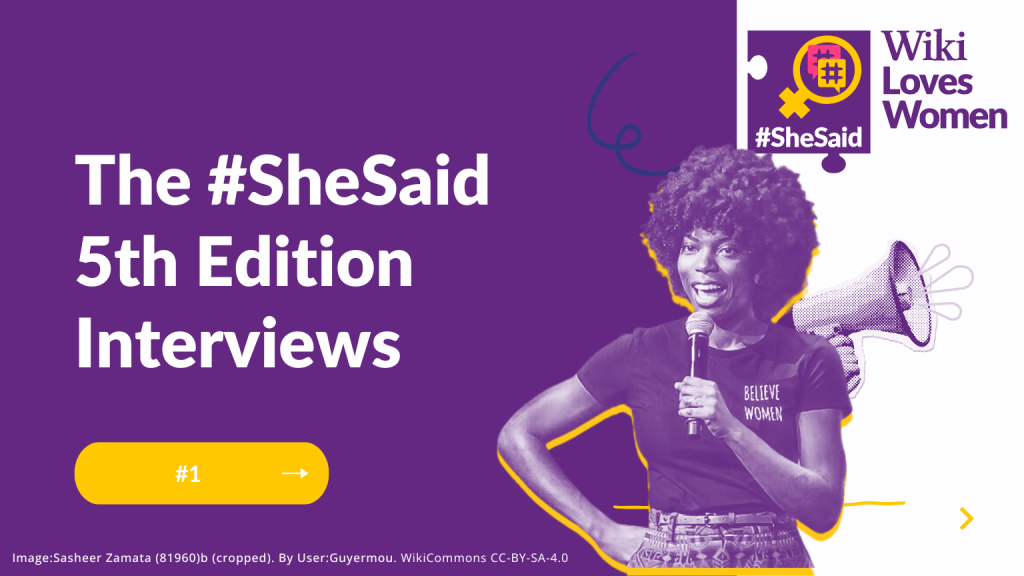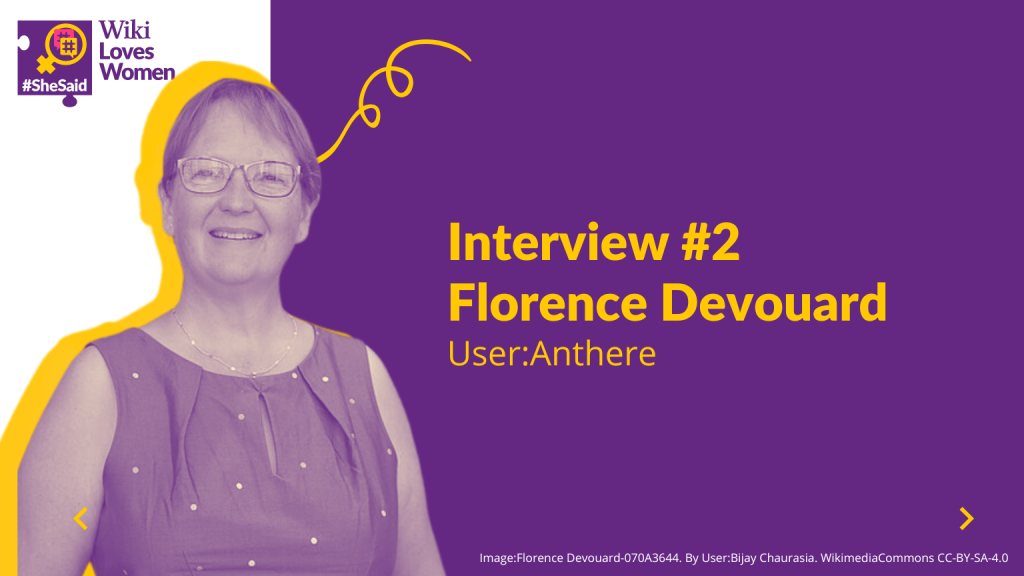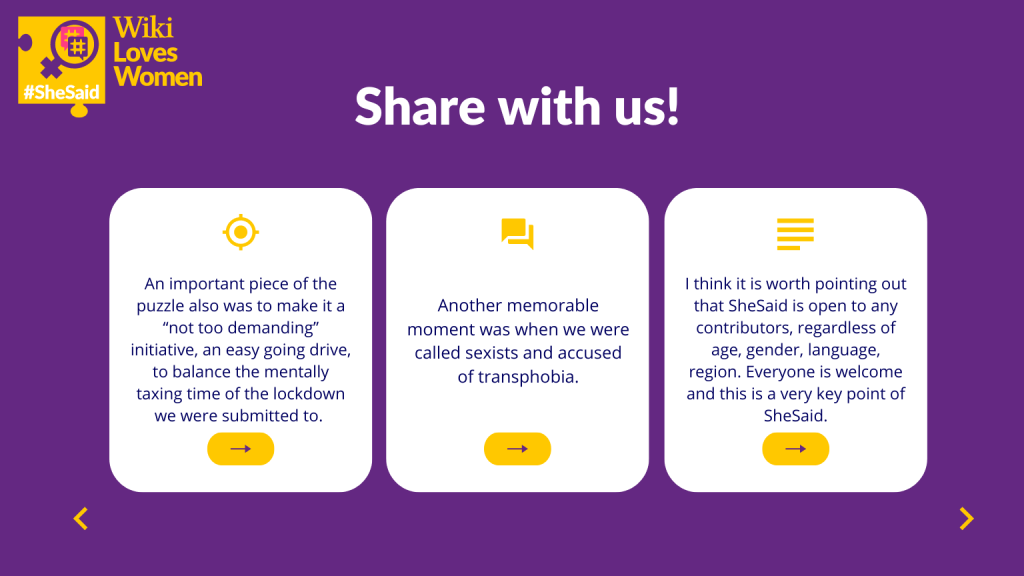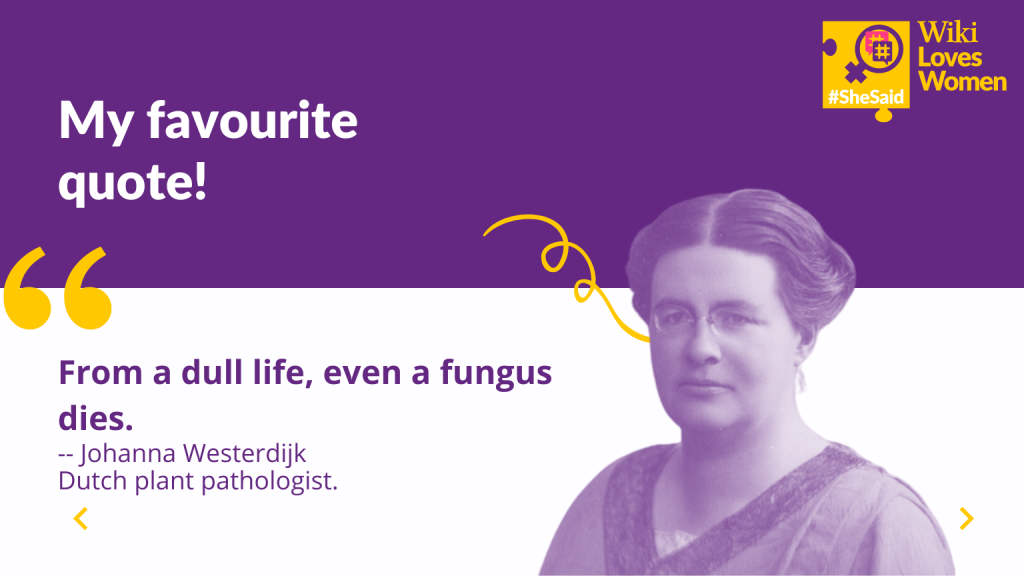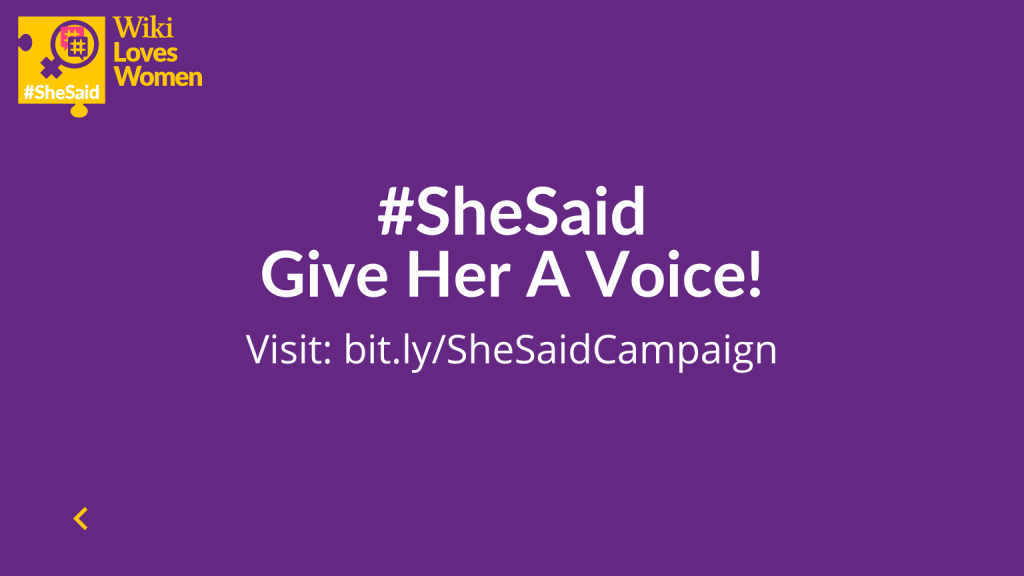Welcome to the 5th edition of the #SheSaid campaign. This is the first in our series of interviews, and today we are speaking with Florence Devouard, co-founder of the #SheSaid campaign and a key figure in the Wikimedia community. Florence will share some memorable moments from the campaign and explain why it’s so important to continue this work.
Could you tell us about yourself?
I have been a member of the Wikimedia Community for 22 years. I have got involved in many different areas, under many different hats, and it would be hard to summarize it all. I noted very early on that women were few on our projects, but only really got involved in fighting the gender gap when Isla Haddow-Flood and myself launched the Wiki Loves Women initiative in 2016. We have explored different strategies to get recruit more women, provide a more inclusive environment, train and support, implement different strategies. The topic is complex..
In 2020, in the middle of the pandemic, I came forward with the idea of #SheSaid… and there we are 4 years later !
Can you share the inspiration behind the #SheSaid campaign? What motivated you to start it?
Soon after the pandemic started, I revamped the Gender Gap portal on meta. The previous pages were quite disorganized, sometimes outdated, and I felt more clarity was needed to motivate newcomers to better grasp the context and to foster more initiatives. After I was done with the creation of the new portal pages, I wondered what could be done to work on the topic, whilst every one was stuck home and edit-a-thons were suspended. With the experience of the poorly welcoming Wikipedia environment for newcomers, I thought we could focus on a different wikimedia project. I went looking for a more peaceful and inclusive space, where new participants could fit whilst experienced wikipedians could enjoy a new experience.
An important piece of the puzzle also was to make it a “not too demanding” initiative, an easy going drive, to balance the mentally taxing time of the lockdown we were submitted to.
Those were the three seeds of the inspiration : continuing our efforts to collect and curate knowledge, whilst facilitating the renewal of contributors, and preserving the energy of the experimented.
What were the initial challenges you faced when launching the first edition of #SheSaid?
I think the main challenge I have faced has been the same one year after year after year : tracking what was produced. This is particularly difficult as #SheSaid is multilingual and every active team has its own way of tracking (or often not tracking) what is being done. Missing or broken or non adapted tools are not helping measure impact. And measuring impact is very important to maintain energy levels !
Can you share any memorable moments or milestones from previous editions of the campaign?
One memorable moment might be when I realized the hashtag tool, which I planned using to measure impact, was not working any more… and that the owner of the tool was not really responding. Uh.
Another memorable moment was when we were called sexists and accused of transphobia. I will not go into more details, but it really hurt and made me upset.
How do you measure the success of each edition, and what achievements are you most proud of?
I was very happy that some groups immediately thought it was a great idea and joined in 2020. Participants come and go and participating figures are on the rise. Entries are created, and they are on the rise too. People get interested in Wikiquote more than before. New Wikiquote languages are open, in new languages. New participants enter the community through this initiative door. All that is pretty cool.
What is your vision for the future of #SheSaid? Are there any new initiatives or directions you’re excited about?
I hope we can keep the initiative a rather easy going, low pace one. It is essentially a multilingual WikiProject. What would be nice is to be able to capitalize on some of the best entries to promote our knowledge base to the larger public.
The #SheSaid campaign highlights women’s voices, but inclusivity remains a key topic in today’s discussions. How do you ensure the campaign is inclusive of diverse voices?
I think it is worth pointing out that #SheSaid is open to any contributors, regardless of age, gender, language, region.
Everyone is welcome and this is a very key point of #SheSaid. Last year we had contributors from any gender, participating in Arabic, Italian, Gungbe, Catalan, Ukrainian, French, Spanish, English, Bengali, Igbo, Central Bikol, Tagalog, German, Slovene, Swahili, Serbian, Telugu, Fante, Dutch and Assamese.
We also took the time to clarify the aim in terms of content expected. The primary and most important goal of the drive is to collect quotes « from women ». Occasionally, the quotes may be « about women » or they may be in tight relation with female gender topics (such as reproductive health); that’s ok but not the primary goal. The primary goal is « from women ».
“Woman” must be understood as “person identified or self-identified as a woman”. Some participants do sometimes add quotes from non-binary people; that’s ok, but not the primary goal.
What advice would you give to others looking to start similar initiatives?
There is space for everyone. Join the existing initiatives, learn from them, do your reading to understand more of the context, talk to people. Stay involved in initiatives you think are relevant and where you enjoy the company. If not, start your own initiative.
What is your favorite women-empowering quote?
I do not know if this is my favorite, but I rather like “From a dull life, even a fungus dies”. Johanna Westerdijk, Dutch plant pathologist.
Being an agricultural engineer by training, and a 22 years old wikipedian… it fits well with my own involvement in the Open Knowledge Movement.
Thank you Florence!
Thank you.
Read more about the campaign and the fifth edition in our #SheSaid 2024 Launch diff and don’t forget to follow us on social media:
- Website: www.wikiloveswomen.org
- Twitter: @Wikiloveswomen
- Instagram: @WikiLovesWomen
- Facebook Page: @WikiLovesWomen
- Facebook Group: Mind The Gender Gap
- Telegram Group: WikiGenderGap

Can you help us translate this article?
In order for this article to reach as many people as possible we would like your help. Can you translate this article to get the message out?
Start translation
